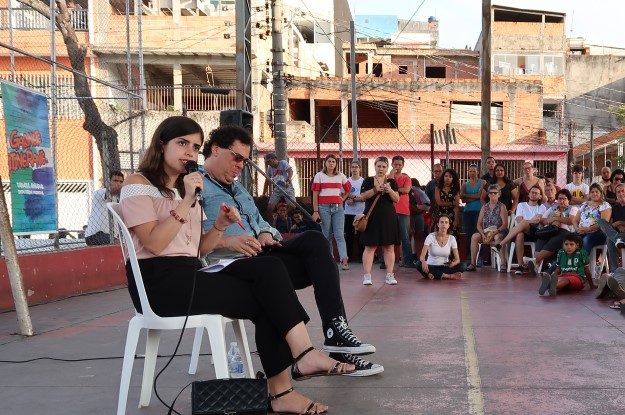SÃO PAULO – “Saved by education.” That was the first thing Tabata Amaral told me about herself when we met in early May at her office in São Paulo, the state the first-term federal deputy represents in Brazil’s Congress. At 25, Amaral isn’t quite the youngest person in the chamber, but her performance so far has quickly catapulted her to stardom – inviting kudos and criticism from both sides of the aisle.
Some are calling Amaral “Brazil’s Alexandria Ocasio-Cortez,” a reference to the first-term U.S. representative known widely as AOC. The two young women have shown a much stronger and more active presence than most first-term legislators, not only having a strong voice in a – still – male-dominated space, but presenting a bold policy agenda.
“I’ve followed Ocasio-Cortez since her campaign,” Amaral told AQ. “We both occupy a space many people think should be out of reach for us.”
Amaral launched her candidacy just a couple of months before the Brazilian election in October 2018, but still received over 260,000 votes in a campaign that, like AOC’s, defied the odds. The daughter of a bus fare collector and a seamstress and domestic worker, Amaral ran on a platform that stressed access to education, a nod to the schooling that lifted her from a low-income neighborhood in São Paulo to a Harvard classroom with a full scholarship to study astrophysics.
Living on a manicured campus in New England while back home friends and family were falling victim to drug abuse, gang violence and poverty prompted a change of plans.
“I was there, with all these opportunities ahead of me, but my father, my siblings, were living under completely different circumstances,” said Amaral. Angered by the contrast between her new life and the one at home, Amaral changed her major from astrophysics to political science – and settled on a career in public service.
Going viral
Before going to school, Amaral had never thought of becoming a politician. She grew up despising how local candidates would come around forcing people in her street to paste campaign materials in their own homes. But as she studied education policy she came to see that politics – not a lack of ideas – was a major factor holding back education in Brazil.
“I saw this amazing project that was shunned because it didn’t favor the local mayor politically,” Amaral said. “It started to become clear to me that the problem was in politics. It wasn’t a technical problem I would be able to help solve with my academic work.”
Amaral’s youth and humble beginnings earned her some attention after she was elected last year. But it was a six-minute grilling of then-Education Minister Ricardo Vélez in a congressional hearing in late March that marked Amaral as a rising star.
In his short, ill-fated term as minister, Vélez changed his ministerial staff multiple times and constant infighting held the department hostage. Public education initiatives ground to a halt – which is why Vélez was invited to explain himself to the education committee in the lower house. Amaral, a member of the committee, watched on in disbelief until it was her turn to question the minister:
“This is a wish list, not strategic planning. In three months of work it is not acceptable to present just a wish list. Where are the projects, the metrics? What are the outcomes expected? Implementation schedule?”
Amaral’s questioning went viral and the stunned minister was pushed out by President Bolsonaro a few days later.
Left, right and in-between
Amaral has her own vision for Brazil’s education system. More than just being about basic literacy, she says schooling should be a way for young people from all walks to be given choices about their future.
“School needs to be a dream incubator, where you figure out what you want and can do, but also prepare for work and labor market,” Amaral said. She also supports basic political education in school, teaching students early on what elected officials do, and who is responsible for what. “I had people ask me what I do, what is right and left. People need to learn to be able to vote.”
Amaral also wants to add incentives for educators especially at the elementary school level, but Brazil’s constitution gives mayors freedom to determine primary education, while states take care of middle and high school education. “We can’t determine early education from Brasília, but we can prioritize quality when transferring funds,” said Amaral. Among her main fights in Congress today are a bill to renew and update a basic education federal funding mechanism set to expire in 2020 and a newly installed commission to oversee the education ministry.
Amaral’s high-energy entree into Brazilian politics has come with some bumps in the road. Members of her own party criticized Amaral, for example, when she supported a pension reform proposed by President Jair Bolsonaro’s neoliberal Economy Minister Paulo Guedes. While she identifies as center-left, Amaral said she’ll support bills she believes in, no matter where they come from.
“I believe in dialogue,” Amaral said. “Bolsonaro’s worst problem is that he justifies his inability to dialogue by hiding behind a hateful rhetoric. Dialogue is hard. It requires sharing power.”
Amaral is still worried about the course public education has taken in Brazil under the Bolsonaro administration after the new education minister, Abraham Weintraub, slashed funding for several programs including all federal institutions – calling public universities a place for “brouhahas” – and the research scholarship program.
“I used to think it was just incompetence. But now I see they have a defined project to end education, an anti-education policy,” she said.
Of her own role in forging policy in a deeply divided Brazil, Amaral seems to recognize that change will not come easily.
“New leadership arises exactly to break paradigms; the pressure to break you and put you in a box is very strong, but being in politics you need to have courage.”








